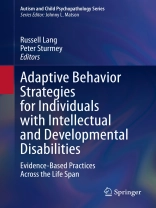This book examines strategies for teaching adaptive behavior across the lifespan to individuals with intellectual and developmental disabilities who regularly experience difficulty learning the skills necessary for daily living. It details evidence-based practices for functional life skills, ranging from teaching such basic hygiene as bathing, brushing teeth, and dressing to more complex skills, including driving. In addition, the volume describes interventions relating to recreation, play, and leisure as well as those paramount for maintaining independence and safety in community settings (e.g., abduction prevention skills for children). The book details existing evidence-based practices as well as how to perform the interventions.
Key areas of coverage include:
- Basic hygiene as bathing, brushing teeth, and dressing.
- Advanced, complex skills, including driving, recreation, play, and leisure.
- Skills to maintain independence and safety in community settings, including abduction prevention skills for children.
- Teaching new technology skills, such as using mobile telephones and apps as well as surfing the web.
- Training caregivers to promote and support adaptive behavior.
- Use of evidence-based practices for teaching and supporting adaptive behavior for individuals with intellectual disabilities and autism.
Adaptive Behavior Strategies for Individuals with Intellectual and Developmental Disabilities is an essential reference for researchers, professors, and graduate students as well as clinicians, therapists, and other scientist-practitioners in developmental psychology, behavioral therapy/rehabilitation, social work, clinical child and school psychology, child and adolescent psychiatry, pediatrics, and special education.
Table des matières
Chapter 1. Adaptive Behavior and Functional Life Skills Across the Lifespan: Conceptual and Measurement Issues.- Chapter 2. Interventions to Support Feeding in People with Intellectual and Developmental Disability.- Chapter 3. Washing, Bathing, Toilet Training, Dressing and Other Hygiene and Health Skills for People with Intellectual and Developmental Disability.- Chapter 4. Teaching Mobility, Public Transportation and Driving to People with Intellectual and Developmental Disability.- Chapter 5. Teaching Communication Skills to People with Intellectual and Developmental Disabilities.- Chapter 6. Academic Skills and People with Intellectual and Developmental Disability.- Chapter 7. Independent Community Skills and People with Intellectual and Developmental Disability.- Chapter 8. Teaching Job and Work-Related Social Skills to People with Intellectual and Developmental Disability.- Chapter 9. Teaching Self-Management Skills to People with Intellectual and Developmental Disability.- Chapter 10. Interventions to Support the Independent Living and Community Safety Skills of People with Intellectual and Developmental Disability.- Chapter 11. Teaching Play and Community Leisure Skills to People with Intellectual and Developmental Disability.- Chapter 12. Training Parents and Staff to Implement Interventions to Improve the Adaptive Behavior of Their Children with Intellectual and Developmental Disability.- Chapter 13. The Role of Web-Based and Assistive Technology in Supporting the Adaptive Behavior of People with Intellectual Disability.
A propos de l’auteur
Russell Lang, Ph.D., is Associate Professor of Special Education and a Board Certified Behavior Analyst (BCBA-D). He has published more than 100 peer-reviewed research papers and multiple book chapters concerning the education and treatment of people with intellectual and developmental disabilities. His primary research interest is in the treatment of challenging behaviors and the acquisition of play and leisure skills in children with autism spectrum disorders.
Peter Sturmey, Ph.D., is Professor of Psychology at the Graduate Center and Queens College, City University of New York. He has published more than 210 articles, 60 chapters, 25 books and more than 250 presentations, mostly in the areas of developmental disabilities and applied behavior analysis.












